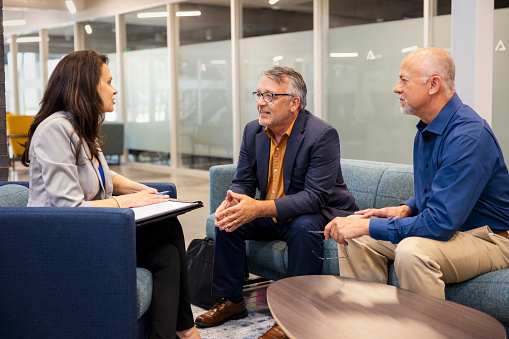What We Do
The Georgia Tech Ombuds is a confidential, informal, independent, and impartial resource for the Georgia Tech community.
If you're experiencing a problem, we will work with you by listening to your concerns, clarifying the issues, helping you brainstorm options, identifying policies and resources, and providing coaching and communication strategies.
You can connect at any stage. This may be your first step, your last resort, or the next step if you are unsure what to do. Georgia Tech faculty, staff, undergraduate and graduate students, and postdocs with Institute-related concerns are encouraged to make an appointment. Appointments are available in person or virtually.
Confidentiality is the defining characteristic of the Office of the Ombuds. The Ombuds is not authorized to accept notice of claims against Georgia Tech and is not a mandatory Title IX reporter. The identity of those seeking assistance from the Ombuds and all communications with them are confidential to the maximum extent permitted by law, with limited exceptions. The Ombuds may disclose confidential information when the person seeking assistance gives permission, when failure to do so might result in an imminent risk of serious harm, when expressly required by law, or as necessary for the Ombuds to defend against a formal complaint of professional misconduct.
(text and background only visible when logged in)
Services Include:
Consultation
The Ombuds offers confidential, one-on-one coaching to help you:
- Explore options and next steps
- Develop a strategy that feels right to you
- Learn tools for communication and conflict resolution
- Identify relevant policies, offices, and resources
Meetings are voluntary and confidential. Exceptions to confidentiality will be explained at the start.
To schedule a meeting, contact the office.
Mediation
Mediation is a voluntary and informal conversation between people in conflict, guided by the Ombuds, a Georgia Registered Neutral and experienced mediator. Mediation aims to give the parties involved an opportunity to share perspectives, build understanding, and work toward a mutual resolution.
The process usually begins with one-on-one preparation meetings. Participation is optional at all times. The Ombuds keeps all conversations confidential, with limited exceptions that will be explained before the mediation. The Ombuds cannot guarantee that other parties will keep confidentiality.
See our Mediation FAQs for more information or contact the office.
Education and Training
The Ombuds offers free seminars and workshops for Georgia Tech faculty, staff, and students to strengthen skills in communication, conflict resolution, and team dynamics. Sessions can be customized and are ideal for meetings, classes, student groups, or events. Popular topics include:
- Conflict Resolution Fundamentals
- Intercultural Communication
- Bullying and Mobbing
- Working with High Conflict People
Interested in scheduling a session or requesting a custom workshop?
Who We Help
- Consultation
- One-on-one private consultation to brainstorm how to resolve a conflict or issue or how to prepare for a difficult conversation.
- Common issues: conflicts between faculty or between faculty and administration, conflicts with grad students or lab members, issues related to supervising or mentoring, questions about Institute policies and procedures.
- Mediation
- The Ombuds can mediate conflicts between faculty, faculty and administrators, faculty and students, or faculty and staff. Ombuds Office mediation is always voluntary and informal for all parties.
- Common mediation topics: authorship and PI/co-PI conflicts, graduate student/staff workloads or work completion plans, conflicts with students, departmental conflicts.
- Education and Training
- Invite the Ombuds to your classroom or any meeting (departments, labs, etc.) for a 10-30 minute introduction to the Ombuds Office.
- Invite the Ombuds to present a seminar (45 minutes or longer) on conflict resolution fundamentals, intercultural conflict, and related topics.
- Consultation
- One-on-one private consultation to brainstorm how to resolve a conflict or issue or how to prepare for a difficult conversation.
- Common issues: conflicts or communication issues with supervisors or co-workers, questions about Institute policies and procedures, questions about whether and where to report something, conflicts with faculty members.
- Mediation
- Any staff member may request mediation from the Ombuds Office. In mediation, the Ombuds acts as a neutral facilitator to help two or more people have a difficult conversation with each other and, if the parties wish, reach an agreement with one another.
- The Ombuds can mediate conflicts between staff, staff and supervisors, faculty and staff, or staff and students. Ombuds Office mediation is always voluntary for all parties.
- Common mediation topics: staff workloads or work conditions, communication issues.
- Education and Training
- Invite the Ombuds to your team meeting for a 10-30 minute introduction to the Ombuds Office.
- Invite the Ombuds to present a seminar (45 minutes or longer) on conflict resolution fundamentals, intercultural conflict, and related topics.
- Consultation
- One-on-one private consultation to brainstorm how to resolve a conflict or issue or how to prepare for a difficult conversation.
- Common issues: Conflicts with Advisors/PIs, switching Advisors/PIs, lab conditions or safety, bullying, ethics, classroom issues, conflicts with other students, academic misconduct, understanding U.S. academic culture or Georgia Tech culture, policies, or procedures.
- Mediation
- Any graduate student may request mediation from the Ombuds Office. In mediation, the Ombuds acts as a neutral facilitator to help two or more people have a difficult conversation with each other and, if the parties wish, reach an agreement with one another.
- The Ombuds can mediate conflicts between grad students, graduate and undergraduate students, grad students and faculty or staff members, or grad students and postdocs. Ombuds Office mediation is always voluntary for all parties.
- Common mediation topics: communication or interpersonal issues between grad students and faculty, interpersonal issues between grad students or lab members, negotiating completion plans or workloads.
- Education and Training
- Invite the Ombuds to your student org or team meeting for a 10-30 minute introduction to the Ombuds Office.
- Invite the Ombuds to present a seminar (45 minutes or longer) on conflict resolution fundamentals, intercultural conflict, and related topics.
Additional Resources
- Consultation
- One-on-one private consultation to brainstorm how to resolve a conflict or issue or how to prepare for a difficult conversation.
- Common issues: Communication issues or conflicts with faculty or TAs/RAs, understanding policies and procedures, assistance after being accused of something, ethical dilemmas, whether and how to report something.
- Mediation
- Any student may request mediation from the Ombuds Office. In mediation, the Ombuds acts as a neutral facilitator to help two or more people have a difficult conversation with each other and, if the parties wish, reach an agreement with one another.
- The Ombuds can mediate conflicts between students, students and faculty, students and staff, or within a student organization. Ombuds Office mediation is always voluntary for all parties.
- Common mediation topics: communication or interpersonal issues between students and faculty or teaching/research assistants.
- Education and Training
- Invite the Ombuds to your student org or team meeting for a 10-30 minute introduction to the Ombuds Office.
- Invite the Ombuds to present a seminar (45 minutes or longer) on conflict resolution fundamentals, intercultural conflict, and related topics.
Additional Resources
- Consultation
- One-on-one private consultation to brainstorm how to resolve a conflict or issue or how to prepare for a difficult conversation.
- Common issues: Conflicts with supervisors, mentors, or PIs; lab management, workloads, or safety concerns; conflicts with lab members; understanding Georgia Tech resources and what is available to postdocs.
- Mediation
- Any postdoc may request mediation from the Ombuds Office. In mediation, the Ombuds acts as a neutral facilitator to help two or more people have a difficult conversation with each other and, if the parties wish, reach an agreement with one another.
- The Ombuds can mediate conflicts between postdocs, lab members, postdocs and faculty/supervisors, postdocs and staff members, or postdocs and administration. Ombuds Office mediation is always voluntary for all parties.
- Common mediation topics: communication or interpersonal issues between postdocs and faculty, interpersonal issues among lab members, authorship, negotiating completion plans or work hours.
- Education and Training
- Invite the Ombuds to your organization or team meeting for a 10-30 minute introduction to the Ombuds Office.
- Invite the Ombuds to present a seminar (45 minutes or longer) on conflict resolution fundamentals, intercultural conflict, and related topics.
(text and background only visible when logged in)
Frequently Asked Questions (FAQs)
You may want help resolving conflicts with co-workers, students, faculty, or supervisors; addressing communication problems; thinking through concerns about job/academic status or work/school environment; or questions about what options are available for handling a problem. Or you may want to learn what resources are available to you, request a reality check, or get help understanding policies and procedures. Topics might include:
- Conflict with someone at Georgia Tech
- Departmental and interdepartmental conflicts
- Preparing for a difficult conversation
- Violations of Institute policy
- Bureaucratic frustrations
- Retaliation
- Ethical dilemmas
- Cultural misunderstandings
- Conflicts of interest
- Disciplinary actions
- Research misconduct
- Incivility or rudeness
- Health and safety concerns
- Unprofessional conduct
- Academic freedom and integrity
- Protecting your reputation
- Actively listen to your questions and concerns
- Offer information about Georgia Tech policies, procedures, and programs
- Discuss your concerns and clarify issues
- Help identify and evaluate a range of options for resolving a problem
- Gather information and offer referrals to other resources
- Advise you on steps to resolve a problem informally
- Facilitate communication indirectly or, when given permission, through serving as an impartial third party
- Work for collaborative agreements through negotiation or mediation
- Track perceived issues and trends
- Make recommendations for reviews of policies or procedures to appropriate bodies
- Make decisions, findings of fact, or determine the “guilt” or “innocence” of those accused of wrongdoing
- Establish, change, or set aside policies or administrative decisions
- Offer legal advice
- Offer psychological counseling
- Participate in grievances or other formal processes
- Serve as an agent of notice for Georgia Tech
- Serve as an advocate for any individual
In the Ombuds Office, a mediation is a conversation between two or more people facilitated by an impartial person (an ombuds) who has no stake in the conflict. Participation in mediation is entirely voluntary for all parties involved, including the ombuds, and anyone involved in the mediation can end it at any time. The Ombuds will maintain confidentiality before, during, and after the mediation. Exceptions to confidentiality occur when the Ombuds feels someone is at imminent risk of serious harm, is ordered by a court or regulatory authority to testify or submit information, or needs to defend themselves against formal complaints.
Typically, the Ombuds will meet separately with all individuals before deciding if informal mediation is appropriate. In mediation, people meet face-to-face to listen to each other, express their needs and wants, and develop a plan to resolve their issues. Depending on the situation, the Ombuds may ask each side to talk about why they’re here, ask questions, identify and discuss the parties’ interests, help brainstorm options for solving or mitigating the problem, or stay out of the way if the conversation seems productive.
The Ombuds is impartial and does not render an opinion on whether either party is right or wrong. The Ombuds has no authority to bind parties to an agreement and is present to help the conversation be productive and ensure everyone has an opportunity to express their thoughts. The process is self-determinative, and if any agreement is reached, it will be created and entered into by the parties themselves.
Whether a mediation is fruitful ultimately depends on the people in conflict. The chance of success is high if they come in good faith, are willing to listen to each other respectfully, consider all offers of resolution thoughtfully, put themselves in the shoes of the other party, compromise or jointly create a win-win solution, and follow through on their commitments.
The identity of those seeking assistance from the Ombuds and all communications with them are confidential to the maximum extent permitted by law, with limited exceptions. The Ombuds may disclose confidential information when the person seeking assistance gives permission, when failure to do so might result in an imminent risk of serious harm, when expressly required by law, or as necessary for the Ombuds to defend against a formal complaint of professional misconduct.
(text and background only visible when logged in)
Meet Your Ombuds

(text and background only visible when logged in)
Dona Yarbrough
Ombuds
Dona is an International Ombuds Association Certified Organizational Ombuds and a Registered Neutral with the Georgia Office of Dispute Resolution. She has 20 years of proven success in promoting productive interpersonal communication, fostering inclusive environments, and encouraging fair practices in higher education and healthcare. Dona came to Georgia Tech in 2025 to serve as the Institute’s Ombuds and establish a new Ombuds Office for all members of the Tech community.
Previously, Dona worked in roles at Tufts and Emory Universities. She also served as the Ombuds for Students at Emory and the Associate Ombuds at Auburn University. She received her PhD in English from the University of Viriginia and taught undergraduate literature, writing, and other courses at Virginia, Tufts, and Emory. Her personal mission is to create inclusive, collaborative, and respectful communities across academic environments. The proud daughter and granddaughter of public school teachers, she believes passionately in the power of public education to positively transform people and the world.
What Guides Us
The Georgia Tech Office of the Ombuds operates under the Code of Ethics and Standards of Practice of the International Ombuds Association. These standards require the Ombuds Office to be confidential, to function independently within the organization, to be impartial, and to decline participation in formal processes. The fundamental principles of confidentiality, independence, informality, and impartiality are core to our work.
The Ombuds holds all communications with those seeking assistance in the strictest confidence allowed by law. The identity of visitors and the substance of concerns raised will not be shared without consent. The exceptions to confidentiality occur 1) when, in the judgement of the Ombuds, a threat of imminent and serious harm to a person exists, 2) when expressly required by law, and 3) as necessary for the Ombuds to defend against a formal complaint of professional misconduct. Visitors are encouraged to avoid putting any details about their issue in voicemail or email to the Ombuds as these are not confidential methods of communication.
The Ombuds Office reports to Georgia Tech administration for budgetary and administrative purposes only. The office functions independent of Institute administration in structure, function, and appearance. The Ombuds has access to senior and executive administrators to convey perceived issues and trends on campus. The Ombuds does not keep records for the Institute and will only furnish anonymous aggregate data in annual reports.
The Ombuds does not participate in any formal adjudicative or administrative procedure or investigations, issue findings, or make or overturn administrative decisions. Contact with the Ombudsperson is completely voluntary and not a required step in any Georgia Tech grievance process or procedure.
The Ombuds is neutral and does not take sides. We consider all perspectives and help parties explore solutions that are fair and consistent with Georgia Tech’s mission and policies. The Ombuds does not advocate for individuals or the Institute.
(text and background only visible when logged in)




